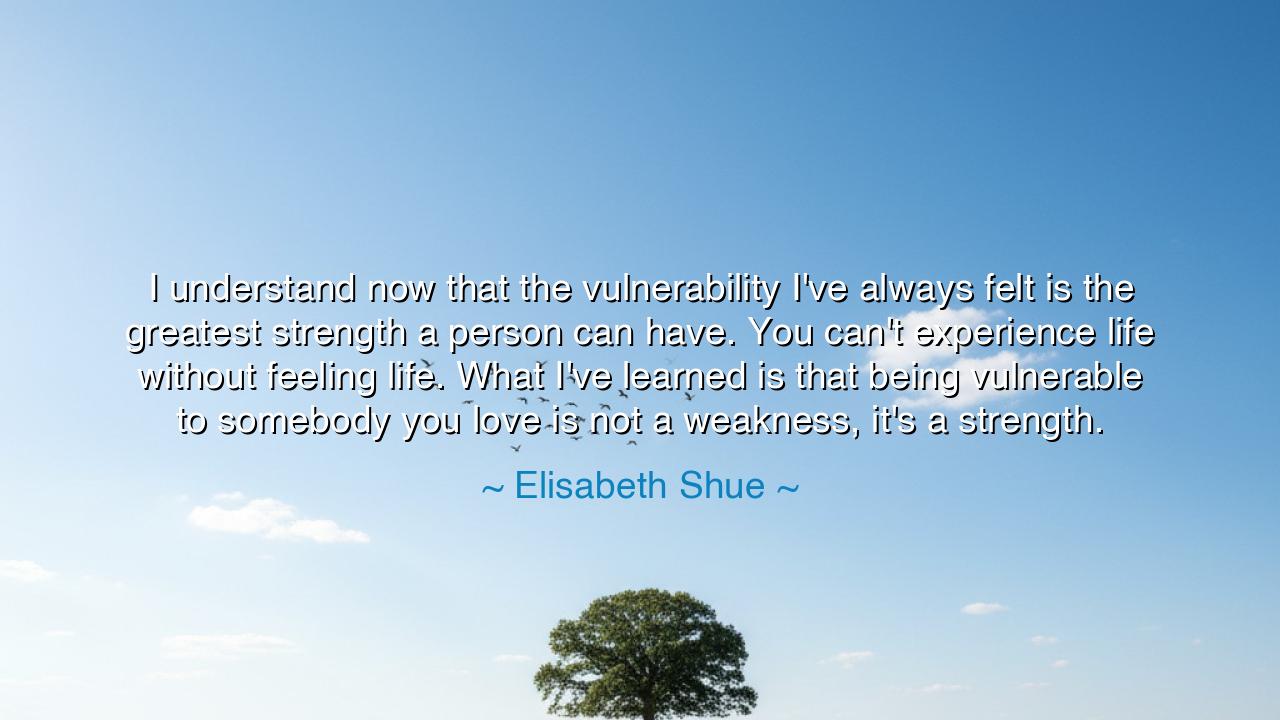
I understand now that the vulnerability I've always felt is the
I understand now that the vulnerability I've always felt is the greatest strength a person can have. You can't experience life without feeling life. What I've learned is that being vulnerable to somebody you love is not a weakness, it's a strength.






Elisabeth Shue’s words, “I understand now that the vulnerability I’ve always felt is the greatest strength a person can have. You can’t experience life without feeling life. What I’ve learned is that being vulnerable to somebody you love is not a weakness, it’s a strength,” ring with the wisdom of one who has walked the valleys of the heart and emerged with clarity. In her reflection lies a revelation that many fear to accept: that the trembling openness of the soul is not the path to ruin, but the path to the deepest form of living. To close one’s heart may guard against pain, but it also bars the door to joy. True strength is found not in hardness, but in the courage to remain tender in a world that wounds.
The origin of her insight is rooted in her own journey as both artist and woman. In the world of cinema, as in life, there is constant pressure to project confidence, control, and perfection. Yet Shue realized that her natural vulnerability—once seen as something to hide—was in fact the wellspring of her humanity and her craft. To feel deeply, to risk rejection, to open herself to love and loss, gave her access to the fullness of life. This wisdom is not only personal but universal: the refusal to feel is not protection but poverty of spirit.
History offers us luminous examples of this truth. Consider Jesus of Nazareth, who, though revered as divine by many, embraced the ultimate vulnerability: to weep, to suffer, to love fully even those who would betray Him. His willingness to feel deeply and to expose His heart did not weaken Him but magnified His strength, leaving a legacy that transformed the world. Through His story we see that vulnerability is not frailty but the very essence of redemptive love.
In another way, think of Mahatma Gandhi, who exposed himself to ridicule, imprisonment, and violence by committing to nonviolence and truth. Many would have called his path weakness, but it was in his vulnerability—his refusal to answer hate with hate—that his strength revealed itself. His openness disarmed even empires, proving that the willingness to suffer without hardening the heart is among the greatest powers a human being can wield.
Shue’s words also remind us that to love without vulnerability is impossible. To love is to risk loss, to risk betrayal, to risk the raw ache of longing. Yet it is this risk that makes love precious. To shield oneself from it may spare immediate pain, but it also starves the soul of intimacy, growth, and connection. She teaches that life itself demands that we feel, and that the courage to feel deeply is the mark of true strength.
For the listener, the lesson is both practical and profound. Do not fear your tears, nor hide your tenderness. Do not mistake the trembling of your heart for weakness. When you open yourself to those you love—when you confess fear, when you admit need, when you reveal hope—you are showing a strength far greater than pride or stoicism. To be vulnerable is to declare, “I am human, and I choose to feel.”
The path forward is this: practice vulnerability with wisdom. Share your heart not with all indiscriminately, but with those who have earned your trust. Allow your love to be real, not guarded. In moments of fear, resist the urge to retreat into hardness; instead, dare to remain open. In doing so, you will not only experience the fullness of life, but also give courage to others who long to do the same.
Thus, let this teaching be passed to the generations: the greatest strength is not the fortress that feels nothing, but the soul that feels everything and yet remains unbroken. To be vulnerable in love is not weakness, but the highest form of courage. Live openly, feel deeply, and let your heart, though scarred, remain alive—this is the true triumph of the human spirit.






AAdministratorAdministrator
Welcome, honored guests. Please leave a comment, we will respond soon